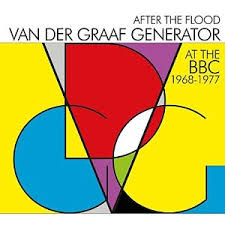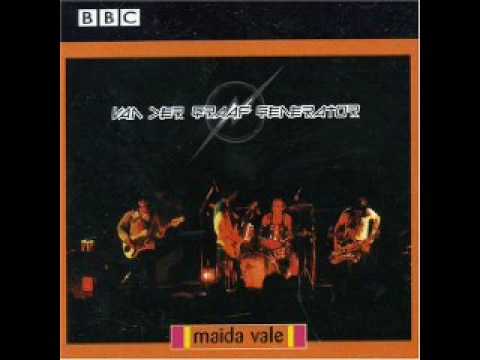Alongside the authorised canon of popular music’s influences, there runs in parallel to the Beatles/Stones/Dylan/whatever orthodoxy, a secret history of bands who might not have penetrated the critical mainstream themselves, but have nevertheless exerted a significant gravitational pull on the future. Van Der Graaf Generator are most certainly one of those bands.
OK, the name’s slightly ungainly, and sometimes ditto the band – but by god, the one thing they weren’t (or rather aren’t, seeing as VDGG have been a going concern again since 2005) is boring. Loved by everyone from Bowie to Lydon, Mark E. Smith to Marc Almond, VDGG emerged in the late 60s from the UK psych scene and quickly developed a uniquely dark, ecclesiastically gothic sound. Initially influenced by the likes of Procul Harum and the Crazy World Of Arthur Brown, they moved in a heavier and weirder direction under the leadership of firebrand songwriter Peter Hammill and became prime movers in the early progressive underground.
But while Yes, Genesis and ELP ultimately made chin-stroking music for sixth formers, VDGG forged a version of prog that felt positively apocalyptic in comparison. King Crimson might have been kindred spirits, but whereas Fripp’s unmerry men were driven by technical virtuosity, VDGG often sounded on the verge of falling apart, pushed over the edge by the elemental intensity of what they were creating. At its best, After The Flood – an extensive compilation of BBC radio sessions recorded between 1968 and 1977 – captures VDGG in the heat and fury of the moment, pushing at the boundaries of rock, jazz and even classical baroque, but remaining unafraid to harness the power of both melody and thumping great riffs.
The first session here from 1968 is an excellent snapshot of why even the nascent VDGG caught the imagination. ‘People You Were Going To’ is an up tempo, almost groovy, piece of psych pop. But Hammill’s unmistakeable voice – part stentorian, part feral – is already present and correct, along with his gleefully mordant worldview: "The people in the downstairs flat are no longer there now because they left the gas tap on, they’re all dead." In contrast, ‘Afterwards’ showcases Hammill’s gift for writing lovely, yearning vocal melodies, snatching at beauty in the existential void (see also here ‘Vision’ and ‘Refugees’). But then we’re back to black with ‘Necromancer’, more ragged and gnarly than its album version, and all the better for it – the double-tracked "I am the necromancer!" chorus is a great Spinal Tap-esque moment.
By 1970, VDGG had assumed its ‘classic’ formation and sound: Hammill railing against humanity’s foibles from behind his piano; Hugh Banton’s churchy but inventive organ playing; David Jackson blowing hell out of two saxes at the same time; and Guy Evans, the band’s restless powerhouse on drums. On saying that, the foreboding yet funky bass of on/off member Nic Potter is the engine behind ‘Darkness’, shadowing its massive chord progression and relentless forward motion. The emphatic surety of Hammill’s delivery is impressive if occasionally a little exhausting, but his dense, occult-referencing lyrics are always a joy. They can be pretty prophetic too – on the twisting, nightmarish jazz/rock fusion of ‘After The Flood’ itself, we get the lines, "The ice is turning to water. The water rushes over all. Cities crash in the mighty wave."
By the following year, VDGG were at the height of their powers, and this is reflected in a session that features a loose but faithful version of ‘ManErg’ – which starts off as a conventionally structured piano ballad before being viciously bisected by a crazed assault of a riff – and a superb second version of ‘Darkness’, which may well top the album original. Also from 1971, and one of the big attractions here for completists, is a previously unreleased in concert session. The quality isn’t perfect, but the highlight is the gutsy, controlled hysteria of ‘Killer’, its urgent, pulse-racing middle section featuring some fine blowing from Jackson.
While VDGG remained an underground act in the UK, they had become one of Italy’s biggest bands, with 71’s Pawn Hearts going to number 1 there and the band playing stadium gigs that would eventually result in hair-raising scenes of shows being hijacked by communist radicals. Burnt out by touring, VDGG went on hiatus for a few years, but regrouped in 1975, returning with a sound that was both more finessed and more muscular. While still vital tracks, the medieval charge of ‘Scorched Earth’ and jerky minstrel rock of ‘Sleepwalkers’ are perhaps a tad under-powered compared to the versions on 75’s brilliant Godbluff, but for me, ‘Still Life’ and ‘When She Comes’ both improve on their originals. The former is harsher and more minimal, the sepulchral intimacy of its extended opening could have been recorded in a cathedral crypt, while the latter is like a jazz band slumming it during Evensong, swinging and leering at the bemused congregation.
The final chapter of this particular time period saw the departure of both Banton and Jackson, with the instrumental slack taken up by Hammill’s increasingly prominent guitar playing and the arrival of Graham Smith on violin. This line-up is represented here by the manic ‘Cat’s Eye/Yellow Fever’ and playful art rock of ‘The Sphinx In The Face’, successfully revitalising their sound in response to changes in the musical climate by 1977. The other major treat here for collectors is an unreleased abridged interpretation of the VDGG classic ‘A Plague Of Lighthouse Keepers’, its beautiful, elegiac opening and ludicrous, galloping conclusion seguing into the instrumental breakdown of ‘Sleepwalkers’.
After The Flood is an excellent package, with the informative booklet also containing some truly terrifying fashion choices. Pawn Hearts or Godbluff might be a better introduction for the VDGG neophyte, but for fans, this is an essential purchase.
<div class="fb-comments" data-href="http://thequietus.com/articles/17809-van-der-graaf-generator-after-the-flood-review” data-width="550">




